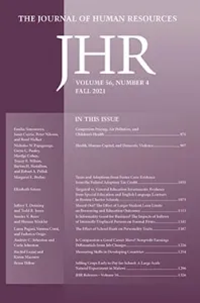糟糕考试的高风险
IF 6
1区 经济学
Q1 ECONOMICS
引用次数: 0
摘要
西非每年有200万名中学生参加协调考试。通过率波动很大,引发了对作弊和短期政策变化的猜测。为了调查这些假设,我们构建了包含2011-2019年项目的混合考试,并对4380名学生进行了管理。考试难度本身就解释了加纳80%的通过率波动,而其他因素在尼日利亚和其他地方仍然有影响。2015年数学考试不及格的考生中,有一半会在2019年通过考试。基于模型的估计表明,提高考试的可比性将使中学毕业生的技能回报率提高6个百分点。JEL分类:I25, I26, J24, O15, O55 * Jack Rossiter,全球发展中心(jrossiter@cgdev.org)。海岸角大学教育规划与管理研究所的may Kojo Abreh说。艾莎·阿里,全球发展中心。Justin Sandefur,全球发展中心。本文使用的数据可在网上获得:Rossiter et al. 2023。“复制数据:糟糕考试的高风险”。哈佛Dataverse。https://doi.org/10.7910/DVN/VM5BOQ。我们特别感谢西非考试委员会的Francis Amedahe和研讨会参与者。我们感谢Abdel Fuseini, Allan Barku, Baaba Sampson, Clemence Ayekple, Cyprian Ekow, Francis Ansah, James Amoateng和Rita Denning提供了出色的研究支持。我们还要感谢Abhijeet Singh、Alexis Le Nestour、Barbara Bruns、Caine Rolleston、Newman Burdett、William Smith和匿名裁判提供的有益意见。这里表达的观点不应归功于全球发展中心、教育规划与管理研究所或它们的资助者。所有的错误都是我们自己的。这项工作得到了比尔和梅林达·盖茨基金会的支持,西雅图,WA[授权号OPP1198125]。在过去三年中,其他资助总额达1万美元的机构有:Rossiter、亚洲开发银行、Echidna Giving、英国外交、联邦和发展部;Abreh,没有;阿里,没有;Sandefur,亚洲开发银行,有效利他主义中心,Echidna Giving,英国外交、联邦和发展办公室,Pousaz Philanthropies,世界银行集团。在文件分发之前,任何一方都无权对其进行审查。IRB批准:海岸角大学机构审查委员会,UCCIRB/EXT/2019/37。doi: 10.3368 / jhr。这篇开放获取的文章是在CC-BY-NC-ND许可(http://creativecommons.org/licenses/by-nc-nd/4.0)的条款下发布的,并且可以在http://jhr.uwpress.org上免费获得。C:我的天哪,我的天哪,我的天哪本文章由计算机程序翻译,如有差异,请以英文原文为准。
The High Stakes of Bad Exams
Each year two million secondary-school students across West Africa sit coordinated exams. Pass rates fluctuate enormously, fueling speculation about cheating and short-term policy changes. To investigate these hypotheses, we construct hybrid exams containing items spanning 2011-2019 and administer these to 4,380 students. Exam difficulty alone explains 80 percent of pass rate fluctuations in Ghana, while additional factors remain influential in Nigeria and elsewhere. Half of the candidates who failed mathematics in 2015 would have passed in 2019. Model based estimates imply that improving exam comparability would increase the Mincerian return to skills among secondary school graduates by 6 percentage points. JEL Classification: I25, I26, J24, O15, O55 * Jack Rossiter, Center for Global Development (jrossiter@cgdev.org). Might Kojo Abreh, Institute for Educational Planning and Administration, University of Cape Coast. Aisha Ali, Center for Global Development. Justin Sandefur, Center for Global Development. The data used in this article are available online: Rossiter et al. 2023. "Replication Data for: The High Stakes of Bad Exams". Harvard Dataverse. https://doi.org/10.7910/DVN/VM5BOQ. Our particular thanks to Francis Amedahe and seminar participants from the West African Exams Council. We thank Abdel Fuseini, Allan Barku, Baaba Sampson, Clemence Ayekple, Cyprian Ekow, Francis Ansah, James Amoateng, and Rita Denning who provided excellent research support. We also thank Abhijeet Singh, Alexis Le Nestour, Barbara Bruns, Caine Rolleston, Newman Burdett, William Smith, and anonymous referees for their helpful comments. The views expressed here should not be attributed to the Center for Global Development, the Institute for Educational Planning and Administration, or their funders. All errors are our own. This work was supported by the Bill & Melinda Gates Foundation, Seattle, WA [grant number OPP1198125]. Other support summing to $10,000 in the past three years: Rossiter, Asian Development Bank, Echidna Giving, UK Foreign, Commonwealth and Development Office; Abreh, none; Ali, none; Sandefur, Asian Development Bank, Centre for Effective Altruism, Echidna Giving, UK Foreign, Commonwealth and Development Office, Pousaz Philanthropies, World Bank Group. No party had the right to review the paper prior to its circulation. IRB approval: University of Cape Coast Institutional Review Board, UCCIRB/EXT/2019/37. doi:10.3368/jhr.0621-11739R1 This open access article is distributed under the terms of the CC-BY-NC-ND license (http://creativecommons.org/licenses/by-nc-nd/4.0) and is freely available online at: http://jhr.uwpress.org by g ue st o n Ju ly 1 8, 2 02 3. C op yr ig ht 2 02 3 D ow nl oa de d fr om
求助全文
通过发布文献求助,成功后即可免费获取论文全文。
去求助
来源期刊

Journal of Human Resources
Multiple-
CiteScore
7.00
自引率
1.90%
发文量
53
期刊介绍:
The Journal of Human Resources is among the leading journals in empirical microeconomics. Intended for scholars, policy makers, and practitioners, each issue examines research in a variety of fields including labor economics, development economics, health economics, and the economics of education, discrimination, and retirement. Founded in 1965, the Journal of Human Resources features articles that make scientific contributions in research relevant to public policy practitioners.
 求助内容:
求助内容: 应助结果提醒方式:
应助结果提醒方式:


